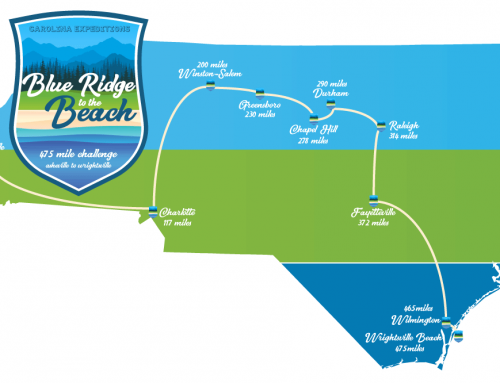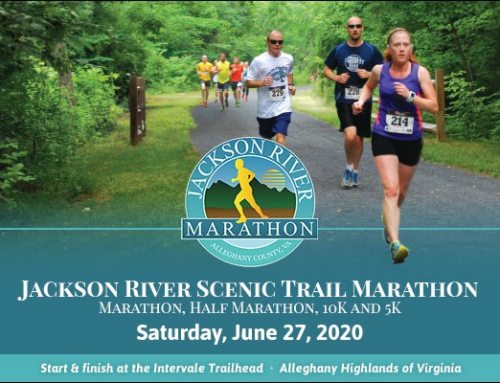Rethinking Fitness
By Joe Nuss
I’m staring at a brown nine-foot stone wall in Chapel Hill’s Forest Theater wondering in what way must I fail at this jump so that evolutionary fitness trainer Colin Pistell, founder of Fifth Ape, doesn’t ask me to try it again. I’m generally a pretty confident person. Run a marathon? Yes, I can do that. Finish an Ironman? Yes, again. Mountain bike across Costa Rica even though I’ve never really mountain biked before? Yes, of course. Jump atop a nine-foot wall? I’m not so sure.
With a sparkle in his eye and a wide grin, Colin stares back at me. I’m about to splat my body against a wall and slide down the face of it like Wile E. Coyote. Maybe my face will hit first and my teeth will shatter into a billion little pieces and fall from my mouth like another Warner Brothers cartoon character in some failed endeavor to catch a rodent or a bird. While thinking of the consequences, I glance over at Colin, who simply grins back at me, as if he knows some secret. If he does, it’s eluding me.
To me, it’s an intimidating wall, but to Colin, it’s simply another three-dimensional problem. It takes someone with a background in developing games to see a game in the Forest Theater, a medieval stone-and-dirt theater set across from UNC on Country Club Road near Gimghoul. So it’s no surprise to me that Colin once developed cell phone games to help market Disney movies. But where he once developed games for couch potatoes, he now develops games for people interested in fitness.
Just like those coach potatoes zoning out with a video game, I have to zone out with my current real-life game that could result in real scrapes and bruises versus a simple “game over” message if I fail. I turn off all the static in my mind and mono-task, as Colin would say, focusing on what he taught me earlier in the day. With dirt on my clothes from our earlier training, and sweat dripping from my face, I run toward the wall …
***
When Colin graduated from USC’s film school, cell phones were just starting to get color screens and businesses were just beginning to realize they could push content to people over cell phones. It was a novel idea at the time, and an amazing opportunity for Colin, who immediately began working for Disney, developing games, ring tones, and wallpaper for mobile phones to help market movies.
“It was really fun to be a young guy in Los Angeles gaining great experience in a new industry and generally doing pretty well for himself,” says Colin. Nevertheless, he soon discovered that working in the entertainment industry in Southern California wasn’t making him happy.
“I grew up on the East Coast in a very beautiful area where there were lots of wooded areas with streams to play in and trees to climb in, and I loved that, but here I was working in this big sprawled-out dirty mess of a city,” says Colin. “I realized, too, that in my job the stakes were pretty low. If I totally stopped doing my job, if I messed everything up, the worst thing that would happen is that some kid wouldn’t be able to play a game on his cell phone for another week. I wondered why I was spending 12 hours a day at something that ultimately wasn’t all that important.”
An interest in sustainability, not to mention the beautiful green landscape and wooded areas of Chapel Hill, led Colin to the Kenan-Flagler Business School at UNC. But after landing the internship of his dreams – working in the wind-power industry for GE – Colin realized something was still missing.
“It wasn’t anything about GE in particular, or wind power, but it was being back inside, sitting in a cubicle wearing khaki pants and a pressed blue button-up shirt every day. I felt a little bit of my soul dying,” he says.
Colin spent his final year of business school developing what would eventually turn into Fifth Ape.
“Really, the origin of Fifth Ape was my mixed martial arts training in Los Angeles,” says Colin, who points out that while the Ultimate Fighter Championship, or UFC, has popularized mixed martial arts, it doesn’t completely represent the true nature of the sport. “Mixed martial arts requires you to be super tactical and super strategic, always three moves ahead of your opponent. We used to joke that it was just like chess – painful chess! I had a great group of training partners and we lived for each other, we lived for the training, and we lived to make each other better.
“At the same time, there’s a playful side to it,” Colin continues. “You could go outside and look at things that weren’t built for exercise. There are so many things to do and to try and explore and play with. You sort of put those playful goggles on and start looking at what’s around you. There’s so much stimulus outdoors that you can develop into a game. It’s very tactile and way more physically and mentally demanding than pounding out the miles on a treadmill.”
While Colin understands that a linear periodized progression will you help you improve your 5k time, or perhaps your squat, he emphasizes that his Fifth Ape training is going to mean different things to different people. In fact, he laughs at the notion that he is just another business trying to capitalize on the “paleo craze” seen in endurance sports these days.
“I don’t believe in dogma or oversimplification,” says Colin. “The general idea that you can get fit and lose weight very quickly by running around barefoot and eating nothing but meat is a very compelling brand, but it’s just a ridiculous caricature. It’s not what real paleo life or diet was like, which is certainly something you wouldn’t want to emulate.
“For those people who don’t like the whole gym atmosphere, or treadmill, my Fifth Ape training is going to be fun and compelling. Triathletes will find that a lot of the explosive stuff, like jumping and landing, will help them become more well-rounded athletes. But everyone’s development is going to be a little bit different,” says Colin.
“I’m here as a field guide to the beautiful wilderness out here for you to explore. It’s rich beyond measure and there’s more here than you could ever imagine, but you’re the one who’s driving. I want people to form their own relationship with my training. I’m here to help you improve faster, safer and better than you would on your own, but it’s ultimately you and your group of people who need to make it happen.”
The sense of community Colin formed with his mixed martial arts training partners is something he imparts to his classes at Fifth Ape.
“So much of it is mental,” he says. “Your strength is not just your strength, but the community’s strength. Let’s say you’re standing on the edge of that jump and you’re looking at that gap and you’re looking at the other side and you can see it just getting further and further away. The longer you look at it, the harder your heart pounds. You’re trying to compose yourself and focus. In that moment, if you have a group of people with you who are there to encourage you and support you and want for you to make it just as much as you want to make it, you can draw on that strength and energy to make you better and stronger in that moment and help you break that jump.
“I know I’ve done my job right if everyone in the group goes nuts just as much as the guy who got it because it’s everyone’s success. And if he doesn’t get the wall that day, everyone supports him because everyone else has been there. Everyone else has struggled.”
***
The gravelly dirt crunches beneath my sneakers as I run toward the wall, focusing on the exact spot where my right foot will land and I will “explode upwards” my left knee while shooting my arms toward the top of the wall. It’s not pretty, but I make it. As with all the jumps I learned earlier, I know Colin will ask me to attempt it at least two more times. Overconfident, I attack the wall again, but lose concentration, flub my push off the wall and miss the jump. I refocus, mono-task, and try again. I hit it smoothly – like a cat! I think – and try once more, and land it.
And there is Colin, grinning, as if he knew all along I would land it.
“I want people to come out ready to push themselves,” he says. “I want people who are ready to try new things and ready for the fact that it’s going to be mentally challenging as well as physically challenging. But, I also want them to have fun – I want them to play. I want them to come to love it and see it as a great alternative to regular exercise, though to me, it’s the big-box gyms that are really the aberrations. If I can introduce this to people and give them a little bit of insight into this world, I want them to take it and run with it.”






